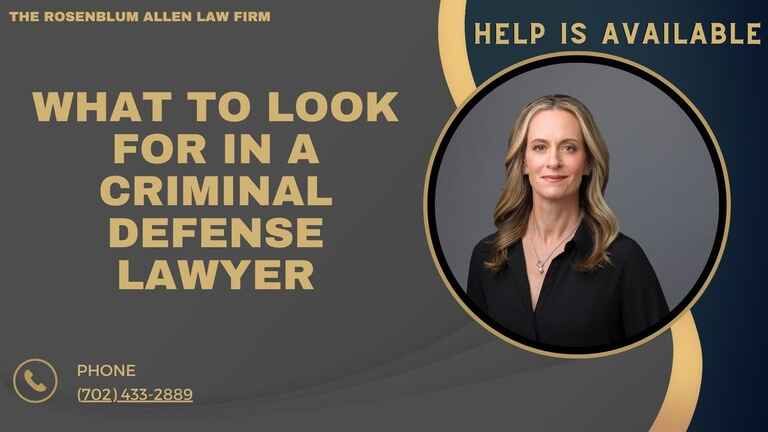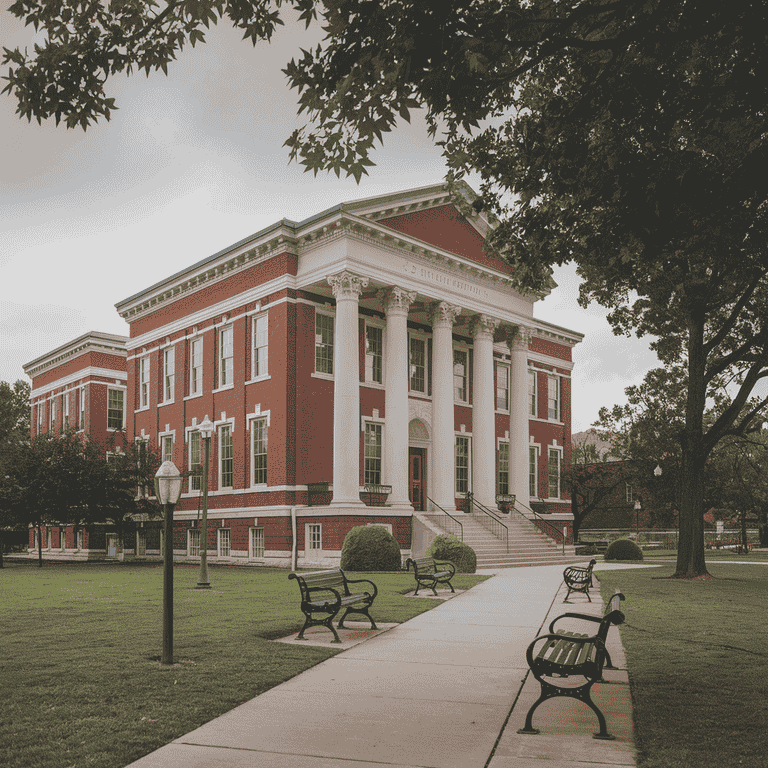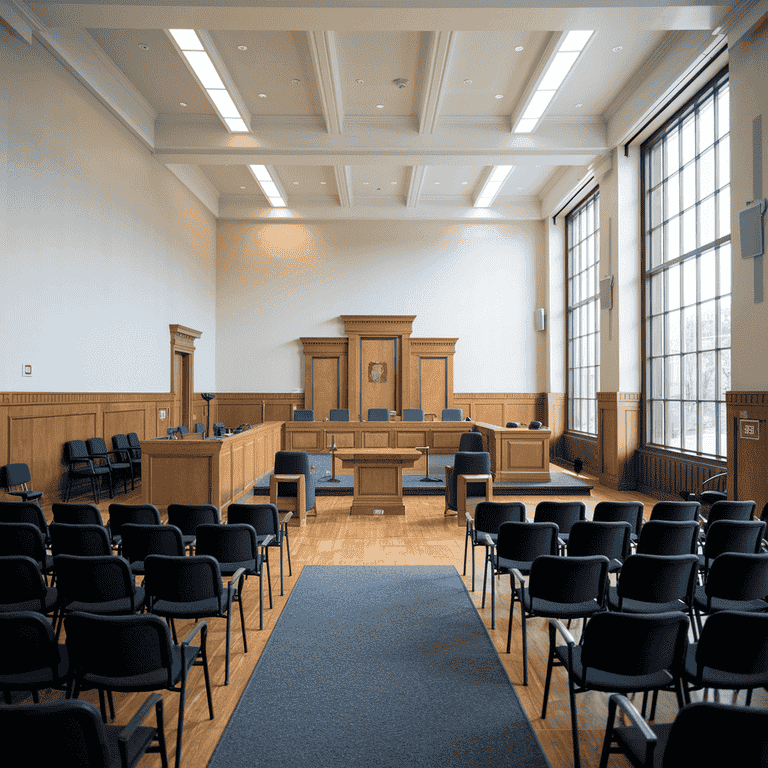What to Look for in a Criminal Defense Lawyer
When facing criminal charges, choosing the right defense lawyer can make all the difference in your case. The process can feel overwhelming, but knowing how to search for a criminal defense lawyer helps you find the right fit. Your lawyer’s skills and experience could be the key to a favorable outcome.
Let’s break down what to keep in mind when searching for a criminal defense lawyer who can effectively handle your case.

Experience and Specialization
Importance of Criminal Law Focus
Not all lawyers practice criminal defense, and it’s essential to hire one who focuses on this area. A lawyer who primarily handles criminal cases will have a deeper understanding of the specific legal knowledge required. Criminal defense requires expertise in statutes, case law, and courtroom procedures that a general practitioner may not have.
Why It Matters
- Lawyers who concentrate on criminal law stay up-to-date with changes.
- They know how to navigate the challenges of criminal cases, from misdemeanors to felonies.
- This level of focus increases the likelihood of a more favorable result.
Case Experience
Experience isn’t just about years in practice; it’s also about the kinds of cases a lawyer has handled. Criminal defense is a broad field, covering everything from DUI to more serious offenses like assault or fraud. You want a lawyer who has worked on cases similar to yours. Ask potential lawyers about their experience with your specific type of charge.
Key Points to Ask
- How long have they been practicing criminal defense?
- What types of criminal cases have they handled? (Misdemeanors vs. felonies, etc.)
- What are their success rates in cases like yours?
Trial Experience
Many criminal cases settle before going to trial, but sometimes fighting in court is necessary. A lawyer with solid trial experience will know how to present your case to a judge or jury. Make sure your lawyer is comfortable in the courtroom and has a history of trying cases to verdict when needed.
Why It’s Important
- Not all lawyers are seasoned trial attorneys. You need one who is prepared to go to trial if it’s required.
- Trial experience helps a lawyer build stronger strategies, even in cases that don’t make it to court.
- They will know how to handle objections, present evidence, and cross-examine witnesses effectively.
Reputation and Client Reviews
Professional Reputation
A lawyer’s reputation in the legal community can say a lot about their ability. Other attorneys, including prosecutors and judges, often have opinions about who the most competent lawyers are. It’s worth doing some research or asking around to see what other legal professionals think of a lawyer you’re considering.
Indicators of a Good Reputation
- Memberships in respected legal organizations, like the National Association of Criminal Defense Lawyers.
- Awards or recognitions from local or national law associations.
- Positive peer reviews from other attorneys.
Client Testimonials and Reviews
Hearing directly from clients can give you an inside look at what it’s like to work with a particular lawyer. Reviews often reveal whether a lawyer communicates well, keeps their clients informed, and ultimately delivers results. Be sure to check multiple review platforms to get a well-rounded view.
Where to Look for Reviews
- Google reviews and ratings
- Legal directories like Avvo or Martindale-Hubbell
- Testimonials on the lawyer’s website
Legal Disciplinary Record
You’ll also want to verify that the lawyer you’re considering has a clean professional record. Check with the state bar association to see if there have been any disciplinary actions or complaints filed against the lawyer. This can give you peace of mind about their ethics and professionalism.
How to Check
- Visit the State Bar website for any disciplinary records.
- Ask the lawyer directly if they’ve had any complaints filed against them and how they were resolved.

Communication and Accessibility
Availability for Consultations
One of the first things to look for in a criminal defense lawyer is their availability. You want someone who can meet with you promptly and set aside time to discuss your case. If a lawyer is difficult to reach right from the start, that could be a red flag. You should expect a reasonable response time when you call to schedule an initial consultation.
Things to Look for:
- Is the lawyer available to meet in person or through video calls?
- Do they return calls or emails quickly?
- Can they work around your schedule, especially if you have urgent needs?
Frequency of Case Updates
Once you’ve hired a lawyer, staying informed about your case is essential. A good lawyer will provide regular updates and explain the progress, whether your case is moving quickly or facing delays. Knowing where you stand helps you prepare emotionally and financially for the next steps.
Key Points:
- How often will the lawyer update you on the case?
- Will they explain the details in clear language?
- Can you contact them if you have questions between formal updates?
Responsiveness to Questions
When you’re in a stressful situation like a criminal case, having a lawyer who answers your questions clearly and promptly can make a big difference. You don’t want to be left in the dark. During your first interactions with a potential lawyer, pay attention to how they handle your inquiries. Do they provide direct answers? Do they take time to explain legal terms?
What to Watch For:
- Are they responsive during the initial consultation?
- Do they take the time to explain legal terms and procedures?
- Can you easily reach them when you have additional questions?
Legal Fees and Payment Structures
Fee Transparency
Legal fees can vary widely, so it’s essential to understand what you’re getting into upfront. A good criminal defense lawyer will be clear about their fees and what services are included. There shouldn’t be any surprises or hidden costs down the line. Before hiring a lawyer, ask them to explain their fee structure in detail.
What You Should Ask:
- Is there a flat fee, or do they charge hourly?
- Are court costs, filing fees, and other expenses included in the estimate?
- Will they provide a written agreement outlining the costs?
Types of Payment Structures
Criminal defense lawyers generally offer a few types of payment options. Understanding these will help you decide which works best for your budget. Some lawyers charge by the hour, while others may offer a flat fee for specific cases, such as DUIs or misdemeanors. Some lawyers may also require a retainer fee, an upfront payment.
Common Payment Structures:
| Type | How It Works |
|---|---|
| Hourly Rate | Charges based on the time spent on your case. |
| Flat Fee | One set fee, regardless of hours worked. |
| Retainer Fee | An upfront payment, usually for larger cases. |
Payment Plans
Legal defense can be expensive, and some lawyers understand that clients may not have the full amount upfront. Ask whether the lawyer offers payment plans that allow you to break down the cost over time. This can make quality representation more affordable.
Key Considerations:
- Does the lawyer offer flexible payment plans?
- What are the terms for the payment schedule?
- Will interest or extra fees apply to a payment plan?

Understanding of the Local Court System
Familiarity with Local Judges and Prosecutors
A lawyer who is familiar with the local court system can have an edge when defending your case. They will know the tendencies of the judges and how certain prosecutors operate. This knowledge can help them predict how different scenarios might play out in your case.
Advantages of Local Knowledge:
- The lawyer may understand how specific judges prefer to handle cases.
- They could have established relationships with prosecutors, which may help in negotiating plea deals or reduced charges.
- Their experience with local court customs could make the process smoother.
Knowledge of Local Court Procedures
Criminal defense lawyers with local experience are well-versed in the specific procedures that apply in your area. Different courts may have unique rules, filing deadlines, or ways of handling evidence. A lawyer who knows these details will be able to handle your case more efficiently.
Local Expertise Includes:
- Knowing how quickly the courts move cases through the system.
- Understanding the local jury selection process.
- Being familiar with the local rules of evidence and how they may impact your case.
Personal Connection and Comfort Level
Trust and Confidence
When you meet with a criminal defense lawyer, you should feel confident that they have your best interests at heart. Trust is key. You’re putting your future in their hands, and you need to believe that they are fully committed to fighting for you. Pay attention to your gut feeling during the consultation. If you feel uneasy, it might be a sign to keep looking.
Signs of Trustworthiness:
- The lawyer is open and honest about your case’s strengths and weaknesses.
- They are straightforward about what they can and can’t do.
- You feel comfortable discussing sensitive details with them.
Empathy and Understanding
Facing criminal charges is stressful. You need a lawyer who not only understands the law but also understands your situation on a personal level. A lawyer with empathy can provide the emotional support you need and make you feel more at ease throughout the process.
Why It Matters:
- A lawyer who listens will better understand your concerns.
- You’re more likely to feel supported and less stressed.
- Good lawyers strike a balance between professionalism and genuine care for their clients.
Negotiation Skills
Plea Bargaining Experience
Negotiation is a key aspect of criminal defense, especially when it involves plea agreements. A skilled lawyer knows when to push for a deal and how to secure the best outcome for you. Not all cases go to trial, and a well-negotiated plea can result in reduced charges or lighter sentences.
Why Plea Bargaining Matters:
- It helps avoid long, drawn-out trials.
- Reduces the risk of facing a harsher penalty.
- May lead to lesser consequences, like probation or fines instead of jail time.
What to Ask:
- How often do they negotiate deals with prosecutors?
- What kind of agreements have they secured in similar situations?
- Will they explain the pros and cons of taking a plea?
Ability to Work with Prosecutors
A lawyer with a good working relationship with local prosecutors can be more effective during negotiations. Even though they are on opposite sides, a lawyer who knows how to communicate well with prosecutors can often secure better results or gain insight into how the case may unfold.
What to Look for:
- Do they have experience interacting with the local prosecutor’s office?
- Are they respected in legal circles?
- What approach do they use when negotiating with prosecutors?

Trial Experience
Comfort in the Courtroom
If your case heads to trial, you’ll want a lawyer who feels at ease in the courtroom. Trial work is different from negotiation, and a lawyer who can confidently present your case to a judge and jury is invaluable.
Signs of Confidence:
- Strong and compelling opening and closing arguments.
- Effective questioning of witnesses.
- Comfort with raising objections and managing evidence.
Knowledge of Jury Selection
Jury selection is a pivotal part of any trial. A lawyer who is skilled in choosing the right jurors can make a significant impact. They know how to identify potential biases and ensure a fair jury.
Jury Selection Insights:
- Do they ask thoughtful questions to screen jurors for fairness?
- Are they experienced in challenging and defending juror selections?
- Have they successfully handled jury trials in the past?
Preparation for Unexpected Developments
Trials can take unexpected turns. A competent lawyer is always prepared for surprises. Whether it’s an uncooperative witness or new evidence, your lawyer should be able to quickly adjust their strategy.
Be Sure to Ask:
- How do they respond to sudden challenges during a trial?
- Have they handled surprise witnesses or new evidence before?
- Can they adapt their defense approach quickly when needed?
Reputation in the Legal Community
Peer Respect and Network
A lawyer’s standing in the legal community says a lot about their capabilities. If they are well-regarded by other lawyers and judges, it usually reflects their experience, professionalism, and skill. Being well-connected locally can also help your case run more smoothly.
Indicators of a Good Reputation:
- Do they maintain positive relationships with judges and court staff?
- Are they respected by other criminal defense attorneys?
- Have they been invited to speak at legal seminars or conferences?
References from Colleagues
Sometimes the best recommendations come from a lawyer’s peers. When other lawyers frequently recommend someone, it’s a sign they trust them to handle challenging cases and deliver results.
Why This Matters:
- Peer endorsements often highlight a lawyer’s strengths.
- It reflects their reliability within the legal field.
- Other lawyers may refer clients to them because of their knowledge.

Personal Compatibility
Comfort Level with the Lawyer
Facing criminal charges is a stressful experience, and it’s important that you feel comfortable with your lawyer. A lawyer who makes you feel heard and supported can make a big difference throughout the legal process. Your connection with your lawyer matters just as much as their skills.
What to Pay Attention To:
- Are they approachable and easy to talk to?
- Do they listen carefully to your concerns and explain things clearly?
- Do you feel like they genuinely care about your case?
Communication Style
Every lawyer has their own way of communicating. Some are more formal, while others take a more casual approach. It’s important to find a lawyer who communicates in a way that suits you. If their language is too complex or they seem rushed, it could make the process harder for you to follow.
What to Ask:
- Do they explain things in a way that’s easy to understand?
- How do they prefer to communicate—by email, phone, or in person?
- Will they answer follow-up questions as your case progresses?

Breaking It Down
Choosing the right criminal defense lawyer is a decision that can significantly impact the outcome of your case. Whether you need someone with strong negotiation skills or proven trial experience, taking the time to find a lawyer who fits your needs is essential. Look for a lawyer who is experienced, communicates clearly, and gives you the confidence that they will fight for your best interests.
Making the right choice in legal representation can bring you peace of mind as you navigate the criminal justice system. When you have a dedicated lawyer on your side, your chances of achieving the best possible outcome improve greatly.

Frequently Asked Questions
What should I ask during my initial consultation with a criminal defense lawyer?
Ask about the lawyer’s experience with cases like yours, their track record in negotiating plea deals or taking cases to trial, and how they would approach your defense. It’s also important to understand their fees, how often they will communicate with you, and what outcomes you can realistically expect.
How can I check a lawyer's reputation in the legal community?
You can look at reviews online, but it’s also useful to ask other lawyers or legal professionals about their opinion. You might also inquire whether the lawyer has received awards or been invited to speak at legal events. If they have a good reputation among their peers, it’s usually a strong indicator of their professionalism.
What’s the difference between a public defender and a private criminal defense lawyer?
A public defender is appointed if you cannot afford a private lawyer, but they often have heavy caseloads and limited time to dedicate to each case. A private lawyer, on the other hand, usually has more time and resources to devote to your defense. Private attorneys can also offer more personalized attention and allow you to choose someone who aligns with your needs.
Is it better to have a lawyer who specializes in criminal defense?
Yes, it is usually better to hire a lawyer who specializes in criminal defense because they have focused experience and knowledge in the area of law that applies to your case. A lawyer who deals with criminal law regularly will understand the procedures, tactics, and local legal system better than someone who practices in multiple areas.
What kind of criminal cases require the most trial experience?
Serious felony charges like murder, sexual assault, or complex white-collar crimes often go to trial, and they require a lawyer with extensive trial experience. Misdemeanors or less serious crimes may be resolved through plea deals, but having trial experience in any type of criminal case is always a plus.
What qualities should I look for in a lawyer who may be taking my case to trial?
Look for confidence, strong communication skills, and the ability to quickly adapt to unexpected developments in the courtroom. A lawyer with solid jury selection knowledge and who is comfortable presenting arguments and questioning witnesses is especially important for trial success.
How do I know if a lawyer is good at negotiating plea deals?
You can ask them directly about their track record in securing plea deals for clients. It’s helpful to know how often they have negotiated successful agreements and what kind of deals they have secured in cases similar to yours. Client testimonials or reviews may also provide insights into their negotiation skills.
What should I do if my lawyer doesn’t explain things clearly to me?
Communication is a key part of a successful defense. If your lawyer isn’t explaining things in a way you understand, you should feel comfortable asking them to simplify their language or take more time to explain. A good lawyer will always ensure that their clients fully understand the legal process and the implications of each decision.
Is it possible to switch lawyers during a case if I’m not satisfied?
Yes, you can change lawyers if you’re not satisfied with your current representation. However, it’s important to do so as early as possible to avoid disrupting your case or causing delays. Discuss your concerns with your current lawyer first, as there may be a way to resolve any issues.
How important is local knowledge when choosing a criminal defense lawyer?
Local knowledge can be very helpful. A lawyer familiar with the local courts, judges, and prosecutors will have insights that could benefit your case. They may also have relationships within the legal community that can aid in negotiations or case management.
What is the typical cost of hiring a criminal defense lawyer?
The cost can vary widely depending on the complexity of the case, the lawyer’s experience, and whether the case goes to trial. Some lawyers charge flat fees, while others bill hourly. It’s important to discuss fees upfront and understand what is included in their services. Be sure to ask if they offer payment plans or other options if cost is a concern.
How do I know if my case will go to trial or be settled out of court?
Many cases are resolved through negotiations and plea deals, but some will go to trial. Your lawyer will assess the evidence, the prosecutor’s willingness to negotiate, and other factors to determine whether a trial is likely. They should give you a clear idea of the risks and benefits of going to trial versus accepting a deal.
Should I worry if my lawyer has a large caseload?
It can be concerning if a lawyer has too many cases at once because it may limit the time they can dedicate to your defense. During your consultation, ask about their current workload and how much attention they can realistically give to your case. If they seem stretched too thin, it might be worth exploring other options.
Can a lawyer guarantee the outcome of my case?
No lawyer can guarantee a specific outcome for your case, and it’s a red flag if they do. While they can give you an idea of what to expect based on their experience, the final outcome will depend on many factors, including the evidence, the prosecutor’s approach, and how the case develops.
What role will I play in my own defense?
You’ll need to provide your lawyer with all relevant information and stay in close communication with them. Your input will help shape the strategy they use. While your lawyer handles the legal aspects, your cooperation and honesty are essential throughout the process.

Additional Resources for You
In addition to the comprehensive insights you’ve just read, our lead attorney, Molly Rosenblum Allen, Esq., has created several additional resources to assist you during this challenging time. Here are some valuable links you can explore:
Theft Crime Defense Lawyer: This resource provides essential information about defending against theft-related charges.
Kidnapping Lawyers: If you’re facing allegations related to kidnapping, this page offers important guidance and legal insights.
Juvenile Defense Lawyers: For cases involving minors, this resource discusses the specific legal protections and strategies available.
Firearms Lawyer Las Vegas: This page focuses on legal representation concerning firearm-related offenses in Las Vegas.
These resources are designed to provide you with the information and support you need. If you have any questions or need assistance, feel free to reach out to our team at The Rosenblum Allen Law Firm. We’re here to help you navigate your legal challenges.

Offsite Resources You May Find Helpful
Here are some resources related to the topic of selecting a criminal defense lawyer in Nevada:
-
Nevada State Bar: Find a Lawyer: The State Bar of Nevada offers a searchable directory of attorneys practicing in the state, which can be used to find a criminal defense lawyer.
-
Martindale-Hubbell: This site provides ratings and reviews for lawyers in many specialties, including criminal defense, and can be an excellent resource for those seeking a lawyer.
-
Avvo: Avvo features ratings, reviews, and disciplinary records for lawyers nationwide, which can be particularly useful when looking for a criminal defense attorney.
-
National Association of Criminal Defense Lawyers: NACDL is a professional bar association for those who specialize in criminal defense. They offer resources and information that can help guide you in your search for a criminal defense lawyer.
-
Legal Information Institute: Criminal Law Overview: Cornell University’s Legal Information Institute offers an overview of criminal law and a free, searchable database of legal resources that can be useful in understanding criminal charges and defense.
-
American Bar Association: Hiring a Lawyer: The ABA provides general advice on how to find and hire a lawyer, including what questions to ask, how to prepare for your first meeting, and understanding legal fees.

What's Next?
Do you live in Las Vegas and need a criminal defense attorney?
Look no further than The Rosenblum Allen Law Firm.
We offer the best criminal defense services in the city, giving you an experienced legal team to defend your rights.
With our years of experience and dedication to providing excellent service, we can deliver on our promise of successful representation for any case.
Plus, with flexible payment options based on individual cases, a more affordable time to hire us has never been!
Don’t wait; reach out today and let us show you why so many people choose The Rosenblum Allen Law Firm when looking for results-driven assistance from a first-class legal firm– call (702) 433-2889 now!





